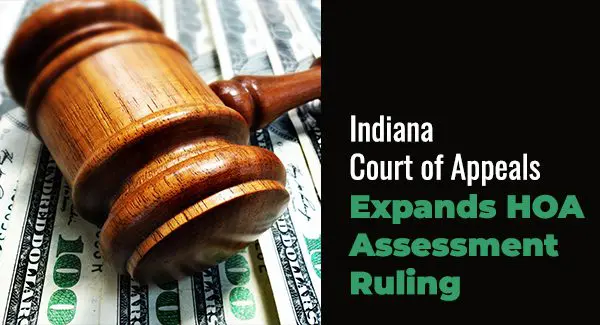- Community Associations, Legal Updates
- Indiana
In a recent decision, Sandoval v. Willow Lake Estates Home Owners Association, Inc., the Indiana Court of Appeals has reaffirmed and expanded its stance on the authority of a homeowner’s association to collect assessments.
Building upon its earlier ruling in Feather Trace Homeowners Ass’n, Inc. v. Luster, the Court in Sandoval has confirmed that a homeowner may not withhold payment of assessments due to the Association’s failure to conduct certain corporate actions not mandated to be conducted by the governing documents.
In a prior ruling, Feather Trace Homeowners Ass’n, Inc. v. Luster, 132 N.E.3d 500, (Ind. Ct. App. 2019), the Court ruled that homeowners could not withhold assessments even when an Association failed to maintain common areas, emphasizing that withholding payment would only worsen the Association’s financial situation. Instead, homeowners were encouraged to pursue alternative legal remedies, such as seeking injunctive relief or holding Association leadership accountable through internal governance actions.
In Sandoval, the Court took this principle further. In Sandoval, the plaintiff homeowner alleged the Association’s failure to hold annual meetings and prepare an annual budget invalidated the owner’s obligation to pay assessments. The Court ruled that governance missteps do not nullify a homeowner’s financial obligations, reinforcing that the Association’s authority to collect assessments remains enforceable even when an Association does not strictly follow the procedures set forth in its governing documents. The Court clarified that procedural failures, while problematic, must be challenged through legal channels rather than through nonpayment. Requiring continued payment, despite asserting issues, ensures the financial continuity of an Association despite internal disputes.
Expanding on Feather Trace, the Sandoval opinion strengthens the governance and authority of Indiana homeowners association and concurrently protects the financial stability and legal framework of the Association. The ruling makes it clear that while homeowners may have valid concerns when an Association fails in its duties, the solution is not to withhold assessments but rather, seek legal remedies.
These cases establish a clear precedent in Indiana law: homeowners remain responsible for the payment of assessments regardless of an Association’s administrative failures.
For a complete review of this opinion, see Sandoval v. Willow Lake Estates Home Owners Association, Inc., No. 24A-MF-309 (Ind. Ct. App. Mar. 12, 2025)
Legal Resource
Questions about delinquent assessment recovery, drafting or revising your Indiana community association’s collection policies, or other legal issues? Do not hesitate to call 855-537-0500 or visit www.ksnlaw.com.
Since 1983, KSN has been a legal resource for condominium, homeowner, and townhome associations. Additionally, we represent clients in real estate transactions, collections, landlord/tenant issues, and property tax appeals. We represent thousands of clients and community associations throughout the US with offices in several states including Florida, Illinois, Indiana, and Wisconsin.
Please note the material contained in this article is for educational and informational purposes only and does not constitute legal advice. No attorney-client relationship is established by your review or receipt of the information contained in this article. You should not act on the information discussed in this article without first obtaining legal advice from an attorney duly licensed to practice law in your State. While KSN has made every effort to include up-to-date information in this article, the law can change quickly. Accordingly, please understand that information discussed in this article may not yet reflect the most recent legal developments. Material is not guaranteed to be correct, complete, or up to date. KSN reserves the right to revise or update the information and statements of law discussed in the article law at any time, without notice, and disclaims any liability for your use of information or statements of law discussed on the article, or the accessibility of the article generally. This article may be considered advertising in some jurisdictions under applicable law/s and/or ethical rules/regulations. © 2025 Kovitz Shifrin Nesbit, A Professional Corporation.



